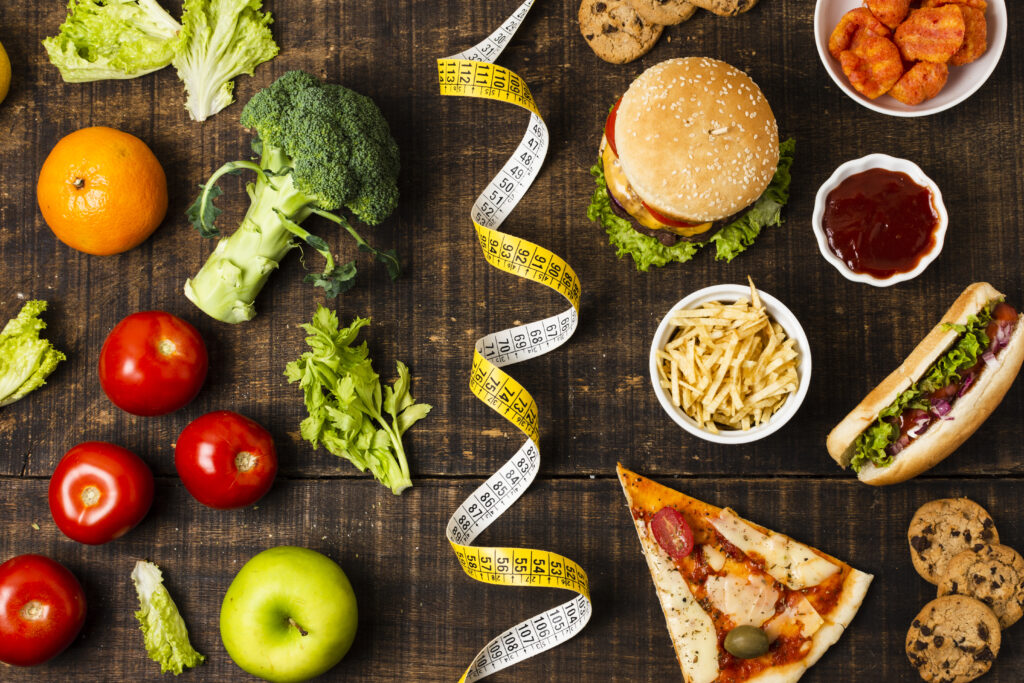Calorie Deficit is often seen as the ultimate strategy to lose weight quickly and effectively. Is Calorie Deficit the Ultimate Weight Loss Solution or Just Another Risky Trend? Let’s uncover the full story.
Table of Contents
Introduction: The Basics of Calorie Deficit
The concept of a calorie deficit involves consuming fewer calories than your body needs to function daily. This process causes the body to use fat reserves as fuel, which helps with weight loss. Therefore, you lose weight. Although this idea appears straightforward, it is actually more complicated than it looks.
Many people blindly follow calorie deficit diets. Many people do this without fully realizing how it affects their metabolism, hormones, or mental health. Though maintaining it is effective for shedding weight, being too aggressive can have adverse effects. Cutting too many calories may lead to:
Constant fatigue
Irritability
Loss of muscle mass
Nutritional deficiencies
Slowed metabolism
Hence, knowing the full picture is essential.
Understanding the Science Behind Calorie Deficit
Weight reduction occurs when your calorie intake is consistently less than your energy output. If your calorie intake drops below your body’s needs, it begins using fat stores to fuel itself. However, a too-low deficit can trigger survival mode. Then, your metabolism slows down.
To follow this approach safely, start by figuring out your Total Daily Energy Expenditure (TDEE). Your Total Daily Energy Expenditure (TDEE) includes your BMR, activity level, and the energy used for digestion. Reducing your calorie intake moderately based on your Total Daily Energy Expenditure (TDEE) helps maintain a healthy calorie deficit.
Once you have your TDEE, creating a shortfall of 500 to 750 calories per day can result in steady and sustainable weight loss, typically around 1 to 1.5 pounds per week. However, larger deficits are not better.

Is Calorie Deficit Always Effective?
Not necessarily. It works in most cases, but other factors play a big role. Hormones, sleep quality, stress, and activity level all influence weight loss. You might eat less but still not lose fat. That’s frustrating, right?
Additionally, under-eating for long periods reduces muscle mass. That lowers your metabolism even more. Eventually, you hit a plateau.
Hence, balance is vital. You need nutrients, exercise, and rest—alongside a calorie deficit.
Also Read: Best Mindset Books
Benefits of Calorie Deficit
A proper calorie deficit offers several advantages:
Fat loss over time
Improved insulin sensitivity
Reduced risk of obesity-related diseases
Motivation boost due to visible progress
When combined with strength training and adequate protein, it helps preserve muscle mass. That’s why fitness coaches recommend it. Moreover, tracking your meals increases awareness of what you eat. So, you make smarter choices.
Also Read: Jeera Benefits (Cumin Seed)
The Side Effects of Calorie Deficit
Let’s not ignore the drawbacks. While the principle of it may sound straightforward, the reality involves more nuance than it first appears:
Fatigue
Poor sleep
Weak immunity
Slower metabolism
Cravings
When you eat too little, your body panics. In such cases, the body may protect fat stores and instead start using muscle tissue for energy. You also might obsess over food. That leads to stress or even eating disorders.
Therefore, avoid cutting calories too sharply.

Psychological Impact of Calorie Deficit
A strict calorie deficit often affects your mind before your body. However, extreme hunger can lead to mood fluctuations and feelings of anxiety. You may isolate yourself to avoid food temptations.
Over time, this relationship with food becomes toxic. For many, eating becomes guilt-ridden instead of joyful. In some cases, this leads to binge eating or bulimia.
Psychological Impact of Calorie Deficit
Doing it right means choosing quality over quantity. Here are a few tips:
Calculate your TDEE and set a moderate deficit.
Eat more protein to preserve muscle.
Prioritize whole foods over junk.
Get enough sleep and reduce stress.
Exercise regularly, especially with resistance training.
Don’t rush. Sustainable progress always beats quick fixes.
Who Should Avoid Calorie Deficit?
Not everyone benefits from it. Pregnant women, growing teens, and underweight individuals should avoid it. Also, those recovering from eating disorders must be cautious.
Medical conditions like thyroid issues or adrenal fatigue complicate calorie regulation. For them, medical supervision is essential.
Your body always tells the truth. Listen to it.

Common Myths Around Calorie Deficit
Also Read: Saunf Magic (Fennel Seeds)
Calorie Deficit vs. Intuitive Eating
Both calorie deficit and intuitive eating have value. One is structured; the other relies on listening to hunger cues. Success depends on discovering what aligns best with your way of living.
Intuitive eating works well once you understand nutrition basics. Otherwise, it may lead to overindulgence.
In contrast, it offers discipline. But it needs balance and flexibility.
Example of a Balanced Calorie Deficit Meal Plan
Here’s an example of a simple calorie deficit meal plan totaling 1500–1700 calories:
Breakfast: Enjoy a warm bowl of oats in almond milk, topped with fresh banana and chia seeds.
Snack: Greek yogurt with honey.
Lunch: Grilled chicken, quinoa, and vegetables.
Snack: Apple and peanut butter.
Dinner: Baked salmon, sweet potato, and broccoli.
Add water, green tea, and proper sleep.
Also Read: Rock Salt Benefits
Exercise and Calorie Deficit: The Perfect Pair
While it creates the base, exercise accelerates progress. Strength training preserves muscle. Cardio burns extra calories.
You should mix both. However, don’t overtrain. That leads to injury and hormonal imbalance.
Rest and recovery matter just as much.

Final Verdict on Calorie Deficit
So, is a calorie deficit great or a mistake? It depends on how you approach it. Used wisely, it’s powerful. Used blindly, it’s harmful.
Moderation and mindfulness are key. Listen to your body. Work with, not against it.

Also Read: 22 Body Heat Hacks
FAQ:
1: What is a calorie deficit?
It means eating fewer calories than your body burns to create fat loss.
2: How much calorie deficit is safe?
A daily reduction of 500 to 750 calories is generally considered a safe approach to fat loss.
3: Does calorie deficit slow metabolism?
Yes. A long-term calorie deficit can lower your metabolic rate if not done carefully.
4: Is it possible to burn fat without cutting calories?
No. It is essential for fat loss, regardless of diet type.
5: What foods help in a calorie deficit?
Eating lean protein, high-fiber vegetables, and whole grains can make maintaining it easier.
6: Is it suitable for everyone?
7: How can you tell if you're actually eating fewer calories than your body needs?
Track your intake and weight. Consistent weight loss is a clear sign your calorie gap is effective.
Also Read: 14 Foods You Should Never Refrigerate
Conclusion
It can support your goals—or work against you if done incorrectly. When handled with awareness and care, it empowers you. When misused, it damages your health. So, plan wisely. Your body deserves respect, not punishment.









